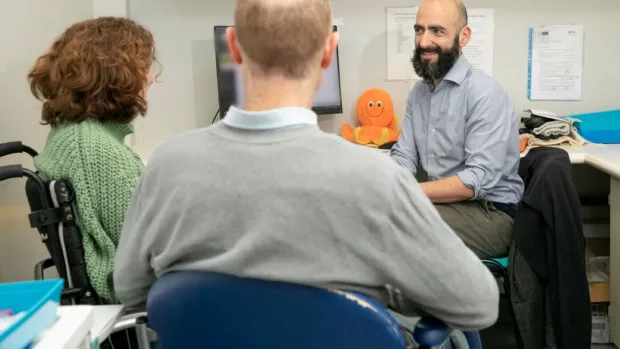
What has prostate cancer got to do with MS?
Max Parmar is Professor of Medical Statistics and Epidemiology at University College London. An expert in clinical trials, he has made countless contributions to medical research. Now he’s turned his attention to MS.
We’ve been talking about Octopus, our multi-arm, multi-stage (MAMS) trial for progressive MS. Professor Max Parmar has already used this approach to change the lives of people with prostate cancer. We asked Max about his plans to use this experience to help us revolutionise MS research.
Hi Max. So first of all, how did you get involved in MS research?
“I’ve worked in clinical trials for 30 years. My research is about running the most effective clinical trials possible, so we can answer the big questions in medicine.
Most of our work focusses on cancer and infectious diseases like HIV, and we’re proud of our successes in these areas. Especially the STAMPEDE trial, which showed we could much more quickly test new drugs to improve prostate cancer survival. So when the MS Society asked me to help create one of the first ever MAMS trials for a neurological condition, I was up for the challenge.”
Great, welcome to the MS team! So what was special about the STAMPEDE trial?
“When we started STAMPEDE, it was a completely new way of running clinical trials. In normal trials, you can usually only test one new drug per trial. So all the expensive infrastructure, from staff to the big databases, has to be set up from scratch every time.
STAMPEDE’s design meant we could start by testing three new treatments and two combinations of treatments at once. And since then, we’ve been able to add in five other treatments, as new evidence emerged to suggest they may help treat prostate cancer more effectively.
It might sound obvious, but it requires lots of really complicated statistics and logistics to get reliable results.”
So this new trial design has already saved lives?
“Yes. In the UK, there are over 10,800 deaths every year from prostate cancer. Before STAMPEDE, the treatment was hormone therapy, which only stops tumours growing for a short time. STAMPEDE has shown that taking certain drugs on top of hormone therapy increase your chances of survival.
More than 12,000 people have joined STAMPEDE, and the findings have changed how men with prostate cancer around the world are treated.”
That’s amazing. But how will it help people with MS?
“The key thing about STAMPEDE is that we’re getting answers to our questions decades faster than we would with any other approach. This is what we want the MS Society’s new trials platform to achieve. To find treatments for everyone with MS, we need trials to produce results much faster. They also need to be cheaper, so charities and universities can fund them.
You made a great start with MS-SMART which tested three drugs at once. Now we’re taking it to the next level. Octopus will use the innovative aspects of STAMPEDE plus some even more advanced features. We hope it will mean we have treatments for MS progression in late-stage trials much faster.“
Are you going to stay involved in MS research?
“Absolutely. I will be leading the platform alongside MS expert Professor Jeremy Chataway. We’re hoping the platform will start recruiting at the end of this year – so watch this space!”




